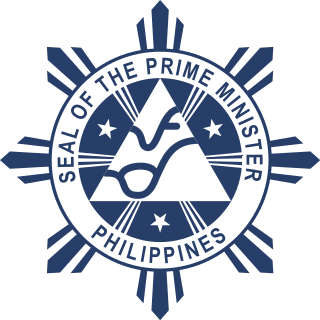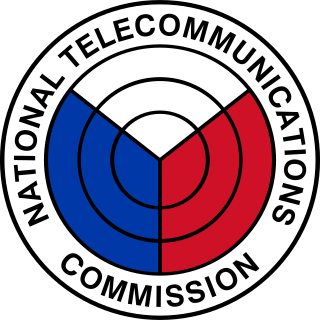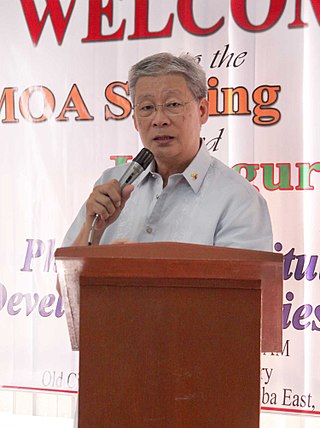
The president of the Philippines is the head of state, head of government and chief executive of the Philippines. The president leads the executive branch of the Philippine government and is the commander-in-chief of the Armed Forces of the Philippines.

The ombudsman of the Philippines is an ombudsman responsible for investigating and prosecuting Philippine government officials accused of crimes, especially graft and corruption.

The prime minister of the Philippines was the official designation of the head of the government of the Philippines from 1978 until the People Power Revolution in 1986. During martial law and the fourth republic, the prime minister served as the head the Armed Forces of the Philippines. A limited version of this office, officially known as the President of the Council of Government, existed temporarily in 1899 during the First Philippine Republic.

Filipino nationalism refers to the establishment and support of a political identity associated with the modern nation-state of the Philippines, leading to a wide-ranging campaign for political, social, and economic freedom in the Philippines. This gradually emerged from various political and armed movements throughout most of the Spanish East Indies—but which has long been fragmented and inconsistent with contemporary definitions of such nationalism—as a consequence of more than three centuries of Spanish rule. These movements are characterized by the upsurge of anti-colonialist sentiments and ideals which peaked in the late 19th century led mostly by the ilustrado or landed, educated elites, whether peninsulares, insulares, or native (Indio). This served as the backbone of the first nationalist revolution in Asia, the Philippine Revolution of 1896. The modern concept would later be fully actualized upon the inception of a Philippine state with its contemporary borders after being granted independence by the United States by the 1946 Treaty of Manila.

The National Economic and Development Authority is an independent cabinet-level agency of the Philippine government responsible for economic development and planning. It is headed by the president of the Philippines as chairman of the NEDA board, with the Secretary of Socioeconomic Planning as vice-chairman. A number of Cabinet members, the Governor of the Bangko Sentral ng Pilipinas, the Chairperson of the Metropolitan Manila Development Authority, the Chief Minister of Bangsamoro, the Secretary of Information and Communications Technology, the Chairman of the Subic–Clark Area Development Corporation, and the National President of the Union of Local Authorities of the Philippines are members of the NEDA Board.

The Securities and Exchange Commission is the agency of the Government of the Philippines charged with the registration and supervision of corporations and securities, as well as capital market institutions and participants, in the Philippines. As such, the Commission champions investor protection in the Philippines, as part of its mandate.

The National Telecommunications Commission is an attached agency of the Department of Information and Communications Technology responsible for the supervision, adjudication and control over all telecommunications services and television and radio networks throughout the Philippines.
The most serious attempted coup d'état against the government of Philippine President Corazon Aquino was staged beginning December 1, 1989, by members of the Armed Forces of the Philippines belonging to the Reform the Armed Forces Movement (RAM) and soldiers loyal to former President Ferdinand Marcos. Metro Manila was shaken by this Christmas-time coup, which almost seized Malacañang Palace. It was completely defeated by the Philippine government by December 9, 1989.
The Constitution of the Philippines is the constitution or the supreme law of the Republic of the Philippines. Its final draft was completed by the Constitutional Commission on October 12, 1986, and ratified by a nationwide plebiscite on February 2, 1987.
The national symbols of the Philippines consist of symbols that represent Philippine traditions and ideals and convey the principles of sovereignty and national solidarity of the Filipino people. Some of these symbols namely the national flag, the Great Seal, the coat of arms and the national motto are stated in the Flag and Heraldic Code of the Philippines, which is also known as Republic Act 8491. In the Constitution of the Philippines, the Filipino language is stated as the national language of the Philippines. Aside from those stated symbols in the Constitution and in Republic Act 8491, there are only six official national symbols of the Philippines enacted through law, namely sampaguita as national flower, narra as national tree, the Philippine eagle as national bird, Philippine pearl as national gem, arnis as national martial art and sport and the Filipino Sign Language as the national sign language. Thus, there is a total of twelve official national symbols passed through Philippine laws.

A Sangguniang Kabataan is a community council that represents youth in a barangay in the Philippines. They were put "on hold", but not abolished, prior to the 2013 barangay elections. In January 2016, the Sangguniang Kabataan Reform Act was signed into law, which made changes to the SK and initially scheduled new elections for October 2016. In March 2017, the elections were postponed to May 2018.
The Presidential Commission on Good Government (PCGG) is a quasi-judicial government agency of the Philippines whose primary mandate is to recover the ill-gotten wealth accumulated by Ferdinand Marcos, his immediate family, relatives, subordinates and close associates, whether located in the Philippines or abroad. It was created by President Corazon Aquino shortly after she was sworn in as president in the aftermath of the 1986 People Power revolution. In addition to recovering the Marcos wealth, it is also tasked with investigating other cases of graft and corruption; and instituting of corruption prevention measures.

Paolo Benigno "Bam" Aguirre Aquino IV is a Filipino politician and social entrepreneur who served as a Senator of the Philippines from 2013 to 2019. He is a member of the prominent Aquino family in the Philippines.

Cayetano "Dondon" Paderanga Jr. was a Filipino economist and former Director-General of the National Economic and Development Authority (NEDA), a cabinet-level agency of the Philippine government responsible for economic development and planning.

Arsenio Molina Balisacan is a Filipino economist and academician currently serving as the Secretary of the National Economic and Development Authority (NEDA). Balisacan first served as the NEDA Secretary from May 2012 to January 2016 under the Benigno Aquino III administration. He then served under the Duterte administration as the Chairperson of the Philippine Competition Commission from February 1, 2016 to June 30, 2022. He was again appointed as NEDA Secretary under the Bongbong Marcos administration. During his first term in 2012, he concurrently served as NEDA Secretary and as Chairman of the Boards of the Philippine Statistics Authority, Philippine Institute for Development Studies, Philippine Center for Economic Development, and Public-Private Partnership Center.

The Philippine Competition Commission (PhCC) is an independent, quasi-judicial body formed to implement the Philippine Competition Act (Republic Act No. 10667). The PhCC aims to promote and maintain market competition within the Philippines by regulating anti-competition behavior. The main role of the PhCC is to promote economic efficiency within the Philippine economy, ensuring fair and healthy market competition.
The judiciary of the Philippines consists of the Supreme Court, which is established in the Constitution, and three levels of lower courts, which are established through law by the Congress of the Philippines. The Supreme Court has expansive powers, able to overrule political and administrative decisions, and with the ability to craft rules and law without precedent. It further determines the rules of procedure for lower courts, and its members sit on electoral tribunals.

The Commission on Population and Development, or CPD, is a Philippine government agency and the lead policy-making and coordinating organization of the country's population management programs.

Gamaliel Asis Cordoba is a Filipino lawyer who was the longest-serving Commissioner of the National Telecommunications Commission (NTC) from 2009 until 2022. He is currently the Chairperson of the Commission on Audit (COA) replacing former Solicitor General Jose Calida. His appointment was confirmed by the Commission on Appointments (CA) on November 29, 2022.














